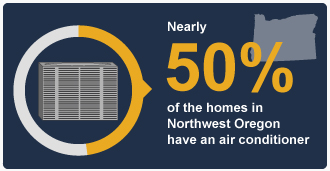Once a luxury for the well-to-do, most homes in the U.S. now have an air conditioner. Considered marvel inventions and complex electromechanical systems at the time of their creation, HVAC systems have become an expected component of the modern-day home. They play such an important role in residential and commercial comfort that cooling and heating makes up about 48 percent of U.S. energy consumption. This common appliance is such an indispensable mainstay that the National Academy of Engineering considers air conditioners one of the top 10 achievements of the 20th century. Before this time, different methods of keeping cool were largely ineffective. With Portland summers heating up to more than 100° days, air conditioning is a necessity of modern existence. Learn more on how to stay cool by keeping your air conditioner running efficiently.
- Ancient Egypt: To keep homes and buildings cool, ancient Egyptians would hang wet reeds in the windows. The water’s evaporation cooled the spaces.
- Ancient Rome: Water diverted from aqueducts through building walls would cause a cooling effect in homes.
- 2nd century: Chinese inventor Ding Huan invents a manually powered rotary fan. Later, in 747, Emperor Xuanzong installs a Cool Hall in his palace, a water-powered fan that cooled the air.
- Early 17th century: Englishman Cornelius Drebbel discovers that adding salt to water cools the air when the water evaporates.
- 1758: Chemistry professor John Hadley and Benjamin Franklin experiment with evaporation, using different liquids to cool objects.
- 1820: English scientist Michael Faraday discovers that ammonia acts as a refrigerant that cools air when compressed and liquefied.
- 1842: U.S. physician John Gorrie invents an ice-making machine using compressor technologies. He later creates prototypes of central air conditioning units. While Gorrie patented his ideas, his progress stalled when his chief financial backer died.
- 1854: Australia’s James Harrison invents an ice-making machine using an ether vapor compression refrigeration system.
- 1902: Willis Carrier of New York invents the first electrical air conditioning unit to improve processes in a printing plant. In addition to cooling the air, the unit controlled humidity levels.
- 1906: North Carolina’s Stuart W. Cramer coins the term “air conditioning” after creating a way to combine water and ventilation to change the environmental conditions in a textile factory.
- 1914: Charles Gates in Minnesota is the first private homeowner with air conditioning in his home.
- 1928: Thomas Midgley, Jr. creates a non-toxic, non-flammable chlorofluorocarbon gas that acts as a refrigerant. DuPont trademarks this and other refrigerants as Freon. The refrigerant names include a number that refer to their molecular composition, such as R-22.
- 1931: J.Q. Sherman and H.H. Schultz invent a portable air conditioner that sits in windows. The device has a number of functions: cooling, heating, dehumidifying, humidifying, and filtering air. During the same year, the Southern California Edison Company installs a heat pump air-conditioning system in its building.
- 1947: Mass-produced, lower-cost window A/C units become available in the U.S.
- 1970s: Central air conditioning units that use coils, a condenser, and fans become available to the public.
- 1987: The National Appliance Energy Conservation Act sets efficiency standards for central and portable air conditioners, as well as refrigerators and freezers. Since this time, several countries banned and phased-out ozone-depleting refrigerants, such as R-12.
- 2000s: Smart technologies allow thermostats to automate compression and airflow systems in HVAC units to reduce home energy consumption. In the future, manufacturers will advance smart technologies so their systems interface with national electric grids, creating a variable speed system that further optimizes energy use while keeping buildings comfortable.
 In 2014, the Northwest Energy Efficiency Alliance reported that nearly 50 percent of the homes in northwest Oregon have an air conditioner, mostly central air conditioning units. Thanks to the trial and error of past scientists and inventors, Portland homes enjoy air conditioning units that are more reliable and efficient than ever. To learn about what type of A/C unit is best for your home, or what A/C services we provide, please don’t hesitate to contact AAA Heating & Cooling. We’ve proudly served 27,000 Oregon customers for over 50 years, see what they have to say here!
In 2014, the Northwest Energy Efficiency Alliance reported that nearly 50 percent of the homes in northwest Oregon have an air conditioner, mostly central air conditioning units. Thanks to the trial and error of past scientists and inventors, Portland homes enjoy air conditioning units that are more reliable and efficient than ever. To learn about what type of A/C unit is best for your home, or what A/C services we provide, please don’t hesitate to contact AAA Heating & Cooling. We’ve proudly served 27,000 Oregon customers for over 50 years, see what they have to say here!